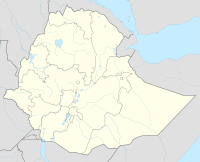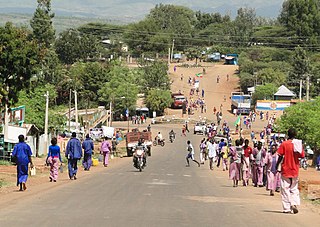
Karat is a town in south-western Ethiopia and the capital of the Konso Zone in the new South Ethiopia Regional State. Situated 20 km north of the Sagan River, this town has a latitude and longitude of 5°15′N37°29′E and an elevation of 1,650 metres (5,410 ft). It is also called Pakawle by some of the neighboring inhabitants. The town and the surrounding villages were inscribed on the UNESCO World Heritage List in 2011 as a cultural landscape for its unique cultural traditions and importance for the Konso people.
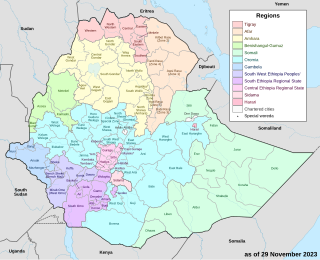
Konso is a zone in the South Ethiopia Regional State, Ethiopia. It was formerly a woreda. Prior to 2011, Konso was not part of any Zone in the Southern Nations, Nationalities and Peoples' Region (SNNPR) and was therefore considered a special woreda, an administrative subdivision which is similar to an autonomous area. In 2011, the Segen Area Peoples Zone was established, which includes Konso special woreda and the 3 former woredas surrounding it. This special woreda is named after the Konso people. Located in the Great Rift Valley, Konso is bordered on the south by the Oromia Region, on the west by the South Omo Zone, on the northwest by Alle special woreda, on the north by Dirashe special woreda, on the northeast by Amaro special woreda, and on the east by Burji special woreda. The Sagan River, which flows south then west to join the Weito, defines part of the woreda's boundary with Burji and the entire length of the boundary with the Oromia Region. The administrative center is Karati; other towns in Konso include Fasha and Sagen. After protesting by residents to become a zone for several years, Konso became a zone in November 2018.

The 2014–2016 Oromo protests were a series of protests and resistance first sparked on 25 April 2014. The initial actions were taken in opposition to the Addis Ababa Master Plan, and resumed on 12 November 2015 by university students and farmers in the town of Ginchi, located 80 km southwest of Addis Ababa, encircled by the Oromia region. The plan was to expand the capital into the Oromia special zone, leading to fears that native Oromo farmers would lose their land and be displaced. The plan was later dropped but protests continued, highlighting issues such as marginalization and human rights. Mulatu Gemechu, deputy chairman of the opposition Oromo Federalist Congress, expressed to Reuters: "so far, we have compiled a list of 33 protesters killed by armed security forces that included police and soldiers but I am very sure the list will grow". Protesters demanded social and political reforms, including an end to human rights abuses like government killings of civilians, mass arrests, government land seizures, and political marginalization of opposition groups. The government responded by restricting access to the internet and attacking as well as arresting protesters.
The Oromo–Somali clashes flared up in December 2016 following territorial disputes between Oromia region and Somali region's Government in Ethiopia. Hundreds of people were killed and more than 1.5 million people fled their homes. The conflict ended in 2018.

Abiy Ahmed Ali is an Ethiopian politician who is the current Prime Minister of Ethiopia since 2018 and the leader of the Prosperity Party since 2019. He was awarded the 2019 Nobel Peace Prize "for his efforts to achieve peace and international cooperation, and in particular for his decisive initiative to resolve the border conflict with neighbouring Eritrea". Abiy served as the third chairman of the Ethiopian People's Revolutionary Democratic Front (EPRDF) that governed Ethiopia for 28 years and the first person of Oromo descent to hold that position. Abiy is a member of the Ethiopian parliament, and was a member of the Oromo Democratic Party (ODP), one of the then four coalition parties of the EPRDF, until its rule ceased in 2019 and he formed his own party, the Prosperity Party.
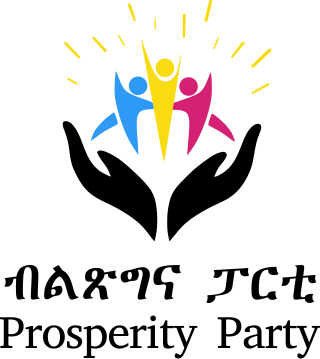
The Prosperity Party is a ruling political party in Ethiopia that was established on 1 December 2019 as a successor to the Ethiopian People's Revolutionary Democratic Front by incumbent Prime Minister Abiy Ahmed.

The Tigray war was an armed conflict that lasted from 3 November 2020 to 3 November 2022. It was a civil war that was primarily fought in the Tigray Region of Ethiopia between forces allied to the Ethiopian federal government and Eritrea on one side, and the Tigray People's Liberation Front (TPLF) on the other.

The Benishangul-Gumuz conflict was an armed conflict mostly in the Metekel Zone of the Benishangul-Gumuz Region in Ethiopia that started in 2019, until peace agreement signed between the rebel groups and the government of Ethiopia in October 2022.
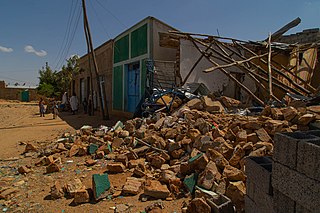
All sides of the Tigray war have been repeatedly accused of committing war crimes since it began in November 2020. In particular, the Ethiopian federal government, the State of Eritrea, the Tigray People's Liberation Front (TPLF) and Amhara Special Forces (ASF) have been the subject of numerous reports of both war crimes and crimes against humanity.
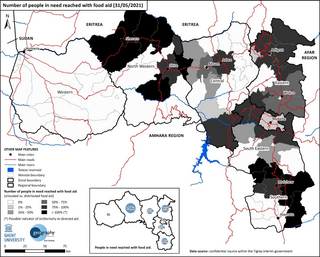
Beginning with the onset of the Tigray War in November 2020, acute food shortages leading to death and starvation became widespread in northern Ethiopia, and the Tigray, Afar and Amhara Regions in particular. As of August 2022, there are 13 million people facing acute food insecurity, and an estimated 150,000–200,000 had died of starvation by March 2022. In the Tigray Region alone, 89% of people are in need of food aid, with those facing severe hunger reaching up to 47%. In a report published in June 2021, over 350,000 people were already experiencing catastrophic famine conditions. It is the worst famine to happen in East Africa since 2011–2012.
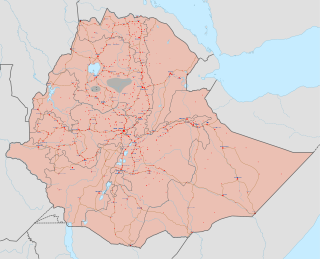
The ongoing Ethiopian civil conflict began with the 2018 dissolution of the Ethiopian People's Revolutionary Democratic Front (ERPDF), an ethnic federalist, dominant party political coalition. After the 20-year border conflict between Ethiopia and Eritrea, a decade of internal tensions, two years of protests, and a state of emergency, Hailemariam Desalegn resigned on 15 February 2018 as prime minister and EPRDF chairman, and there were hopes of peace under his successor Abiy Ahmed. However, war broke out in the Tigray Region, with resurgent regional and ethnic factional attacks throughout Ethiopia. The civil wars caused substantial human rights violations, war crimes, and extrajudicial killings.
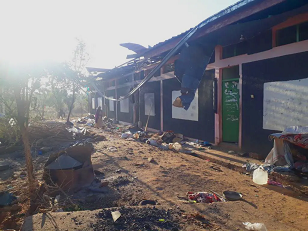
In the late hours of 7 January 2022, the Ethiopian Air Force (ETAF) carried out an airstrike on a camp for internally displaced persons (IDP) set up in Dedebit Elementary School, located in the Tigray Region of Ethiopia. Between 56 and 59 people were killed in the attack, and at least 30 others were left injured.

Since the 1990s, the Amhara people of Ethiopia have been subject to ethnic violence, including massacres by Tigrayan, Oromo and Gumuz ethnic groups among others, which some have characterized as a genocide. Large-scale killings and grave human rights violations followed the implementation of the ethnic-federalist system in the country. In most of the cases, the mass murders were silent with perpetrators from various ethno-militant groups—from TPLF/TDF, OLF–OLA, and Gumuz armed groups.
The 1995 Ethiopian Federal Constitution formalizes an ethnic federalism law aimed at undermining long-standing ethnic imperial rule, reducing ethnic tensions, promoting regional autonomy, and upholding unqualified rights to self-determination and secession in a state with more than 80 different ethnic groups. But the constitution is divisive, both among Ethiopian nationalists who believe it undermines centralized authority and fuels interethnic conflict, and among ethnic federalists who fear that the development of its vague components could lead to authoritarian centralization or even the maintenance of minority ethnic hegemony. Parliamentary elections since 1995 have taken place every five years since enactment. All but one of these have resulted in government by members of the Ethiopian People's Revolutionary Democratic Front (EPRDF) political coalition, under three prime ministers. The EPRDF was under the effective control of the Tigray People's Liberation Front (TPLF), which represents a small ethnic minority. In 2019 the EPRDF, under Abiy, was dissolved and he inaugurated the pan-ethnic Prosperity Party which won the 2021 Ethiopian Election, returning him as prime minister. But both political entities were different kinds of responses to the ongoing tension between constitutional ethnic federalism and the Ethiopian state's authority. Over the same period, and all administrations, a range of major conflicts with ethnic roots have occurred or continued, and the press and availability of information have been controlled. There has also been dramatic economic growth and liberalization, which has itself been attributed to, and used to justify, authoritarian state policy.
The Amhara Association of America (AAA) (Amharic: የዐማራ ማህበር በአሜሪካ) is a non-profit organization based in Charlotte, North Carolina, focused on advocating for the human rights of the Amhara people in Ethiopia.

The Ethiopia–Tigray peace agreement, also called the Pretoria Agreement or the Cessation of Hostilities Agreement (CoHA), is a peace treaty between the government of Ethiopia and the Tigray People's Liberation Front (TPLF) that was signed 2 November 2022, wherein both parties agreed to a "permanent cessation of hostilities" to end the Tigray war. The agreement was made effective the next day on 3 November, marking the two-year anniversary of the war.
Events in the year 2023 in Ethiopia.
This is part of the series of violence between minorities in the Southern Nations, Nationalities, and Peoples' Region (SNNPR) and West Guji Zone of the Oromia regions, causing frequent attacks against ethnic Koore and other minorities in the Amaro special woreda and surroundings. Ethiopian Human Rights Council underscored the increasingly frequent nature and spread of conflicts and security issues in the area and called for preventative measures.
The 2022 North Shewaclashes were a series of clashes that broke out between ethnic Amhara Fano militiamen, the Oromo Liberation Army, and the Ethiopian National Defence Forces in the North Shewa zone in the Oromia region and the Oromia Zone in the Amhara region, which resulted in dozens of people killed and thousands displaced.
